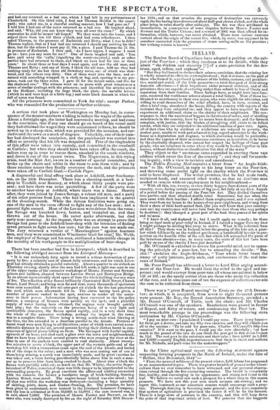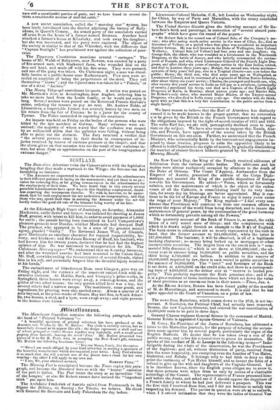The Bandon Board of Guardians have adopted a petition on
the sub- ject of the Puor-law ; which they condemn as to its details, while they admit " the Wisdom and sincerity [?] cf a state-provision for the des- titute, aged, infirm, and orphans"-
There was a " great Repeal meeting" in Ennis on the 27th Decem- ber; at which, it is computed, from seven to eight thousand persons were present. Mr. Ray, the Repeal Association Secretary, attended ; a Mr. Daniel O'Connell, of Turin, took the chair ; and Mr. Charles O'Connell was one of the speakers. Resolutions were passed in favour of Repeal, and fixity of tenure, and condemning the Poor law. The most remarkable passage in the proceedings was the following stern declaration by Mr. Charles O'Connell- " I pay no poor-rate : I proclaimed I would pay none. There is my house— let them get a decree, and take my fifty-two canaries, and they will whistle you all to the auction To be sold for poor-rate, Charles O'Connell's fifty-two canaries!' If it went to the poor, I would pay the rate cheerfully ; but how much in the pound of the rate do you think the poor get in this union ?—just 4s. lid. The rest goes to the autocrats and their subs. ; from 4,0001. to 1,5001. and 1,0001.—mostly English importations—to find them in claret and madeira for Mr. Nicholls, and port-wine for the nnderstrappers."
In the Ulster agricultural report the following statement appears respecting farming prospects in the North of Ireland, under the date of " Belfast, 31st DecemLer, 11342"— " From the unusual mildness of the present winter, field. labour has progressed in an unprecedented degree. There is a greater breadth of ground under wheat- culture than we ever remember to have witnessed, and our personal observa- tions extend through the five connecting counties. The healed is remarkably fine, healthy, and encouraging in its appearance, and strong and broad in the leaf. We believe we never saw such a prospect fur a wheat crop as this season presents. We have not this year seen much autumn oat-sowing; and we regret this, inasmuch as our uncertain seasons would encourage such a prac- tice. Thorough draining is becoming more general ; and the more commonly that system of agriculture is practised the better it will be for the farmers. There is a large store of potatoes in the country, and this will keep down the price of that important article of food. We perceive that the Laggards " But they feel bound to declare their solemn conviction, that the existing law is wholly unsuited to effect its contemplated end ; that it evinces, on the part of those who framed it, a profound ignorance ofethe habits, customs, and peculiari- ties, moral and social, of the Irish peasantry—a total disregard of their strong domestic affections-1 f their impatience under personal restraint, and of the privations they are capable of enduring rather than submit to loss of liberty and separation from their families. T rhese feelings have, as might have been - seen, rendered the workhouse scheme almost a total failure. Most of those ha- bituated to mendicancy in their own union, who were eligible for admission, and willing to avail themselves of the relief afforded, have, in turn, entered, and after a brief stay, abandoned the house, filling the country with reports of the restraint they were subjected to ; and they appear to have acquired by their experiment an additional claim on the charity of their neighbours. The con- sequence is, that the numbers of beggars in the streets of towns, and of strolling mendicants in the country, have by no means been decreased; and the farmers complain, with justice, that the burden of almsgiving still exists to its fullest extent, while they are subjected to the additional taxation of poor-rate. Again, all of that class who by accident or misfortune are reduced to poverty, the modest poor, unable to work and ashamed to beg, regard admission to the work- house as a degradation and disgrace, to which starvation would be preferable; and thus the expense of their maintenance continues, as heretofore, to be borne by the charitably-disposed, who cannot but respect the feelings of those poor people, who are reluctant to enter where they would be herded together in Idle masses, without distinction or classification but that of the sexes.?
They object to the " enormous sums expended in erecting those vast edifices which cover the face of the country "; and they call for search- ing inquiry, with a view to revision and amendment.
The Dublin Evening Mail contains a letter from " An Anglo-Irish- man " to Mr. O'Connell, in reply to his long letter on the Poor-law, and throwing some useful light on the charity which the Poor-law is said to have displaced. The writer premises, that he had made roads, reclaimed lands, and executed other works, so that no destitute man needed to remain without employment in his neighbourhood-
" With all this, ten, twenty, or even thirty beggars, from distant parts of the country, were, during certain seasons of thi year, fed daily at my door. I speak of a period before the passing of the Poor-law Act. They divided themselves into parties, and thus obtained double relief. Sometimes, but not often, the men came with their families: I offered them employment, and it was refused. They went from my house to the houses of my poor neighbours, and wrung from them a share of their hard-earned food, (for you well know that your country- men and my countrymen will never turn from the door those who may perhaps be destitute): they changed a great part of the food thus procured for spirits and tobacco.
" I knew it all, and deplored it ; but I could apply no remedy; for there being no legal mode of poor-relief in Ireland, if I turned a beggar from my door 1 might perhaps be sending him away to starve. What is the inference from all this ? That there was in Ireland, before the passing of the late act, a poor- law which fell heavily on the resident gentlemen, a hundredfold heavier in pro- portion on the humble tiller of the soil, but which left untouched the puree of the luxurious absentee—nay, in many cases, the rents of this last have been paid by means of the charity 1 have just described."
Mr. O'Connell is exhorted to devote his powerful mind, not to oppos- ing the principle of a poor-law, but to amending the details : " But, alas !" exclaims the Anglo-Irishman, " Your whole letter bears the stamp of party interests, party ends, and carelessness of the real inte- rests of Ireland."
Mr. Peter Purcell has addressed a letter to Lord Eliot urging amend- ment of the Poor-law. He would limit the relief to the aged and im- potent; and would exempt from poor-rate all whose annual rent is below 151. or 20/, ; as the needy cottier class are those who resist the collection of the rate, and in nine cases out of ten the expense of collection exceeds the sum to be collected from them. have still a-considerable portion of grain, and we have found in several dis- tricts, a considerable number of stall-fed cattle."
A new secret association, called the " morning star" system, has been lately introduced into the district adjoining the barony of Bally- &dams, in Queen's County. An armed party of the associators carried off arms from the house of a farmer named Brennan. Another band attacked a farmer's house at Kilnabeky, and took away his daughter ; but she was recovered, and the party' were captured. The object of the society is similar to that of the Whitefeet, with the difference that "Captain Starlight" has proclaimed war against the collectors of poor- rates.
The Tipperary Constitution mentions several " outrages." The house of Mr. Walsh of Ballynirro, near Newton, was entered by a party of fire-armed men, with blackened faces, who wounded him on the face and head, and made off with his fire-arms. They were pursued, and one of the gang was taken. On Christmas night, a man was dread- fully beaten at a public-house near Ratbcormack. Five men were ar- rested on suspicion of being the perpetrators of the deed. They call themselves " Gows" ; and the injured man was taken for a " Poleeu," or one of a rival " faction."
The Newry Telegraph contributes its quota. A notice was posted on Mr. Morrison's door, at Annalonghan, near Augher, ordering him to take no more land from the Leslie family, or he would not enjoy it long. Several notices were posted on the Reverend Francis Gervais's estate, ordering the tenants to pay no rent. Mr. Andrew Noble, of Lisnacrieve, a respectable farmer, was severely beaten by two men, on his return from the fair of Fintooa : he is a juror for the county of Tyrone. The Police succeeded in capturing his assailants.
An inquest was held on Friday on the bodies of the persons who were killed by the late accident at Galway. Many witnesses were ex- amined; the majority of whom stated that the confusion was caused by an unfounded alarm that the galleries were falling, without being able to point out the alarmist. The Jury returned a verdict that " the several persons came by their deaths in consequence of in- juries received by reason of extreme pressure at the chapel ; and that the alarm given on that occasion was not the result of any malicious in- tent, but arose from an apprehension on the part of the congregation of extreme danger."































 Previous page
Previous page